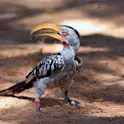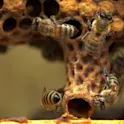
Featured news
08 Jun 2022
New study finds 19th century wooden shipwrecks to be thriving habitats for deep-sea microbiomes
New study in Frontiers in Marine Science finds 19th century wooden shipwrecks to be thriving habitats for deep-sea microbiomes

Featured news
08 Jun 2022
New study in Frontiers in Marine Science finds 19th century wooden shipwrecks to be thriving habitats for deep-sea microbiomes

Featured news
07 Jun 2022
Frontiers joins ‘Stick to Science’ initiative to support open scientific collaboration.

Featured news
03 Jun 2022
We are pleased to announce that the University of Lincoln has joined the UK national open access deal agreed between Jisc Collections and Frontiers. This landmark deal provides a simplified and streamlined route to open access publishing for researchers in the UK. The University of Lincoln supports its researchers in making their research more widely available. As part of this deal, eligible authors may publish in any Frontiers journal with a discount of 10% on Article Processing Charges (APCs) for articles. This agreement will further encourage University of Lincoln researchers to publish open access, increasing the volume of research openly available. While this reduces costs for the researcher, it also benefits the wider research community and the public at large. Information for authors: This agreement provides a discount only and does not cover the full costs of your APC. You are advised to obtain confirmation of funding to cover the remaining 90% of the APC from the University of Lincoln prior to submitting your manuscript. Please visit the University of Lincoln’s Repository and Open Access portal page to learn more about the eligibility criteria and university requirements. Relevant information can be found under Guidance Documents, in the “Frontiers APC discount” slide deck […]

Featured news
03 Jun 2022
By Colm Gorey, Frontiers Science Communications Manager Image: Shutterstock.com Each month, Frontiers shines a spotlight on some of the leading research across a wide range of topics. Here are just some of the highlights that resonated strongly with readers on our news site in the month of May. Children grow faster during school year than during summer holidays It has been long recognized that in western countries, children are more likely to become overweight or obese over the summer. Causes of this include changes in kids’ physical activity and diet over the summer period, including the summer holidays. But in a study in Frontiers in Physiology, scientists from the US show that this ‘obesogenicity’ of summers has another unexpected cause: children grow faster over the school year than over the summer. And because body mass index (BMI) is the ratio of body weight in kilograms and height in meters squared, faster vertical growth during the school leads to increased BMI during summers. “Here we show seasonality in standardized body mass index (BMIz), with children gaining height at a greater rate during the school year compared to the summer,” said Dr Jennette P Moreno, an assistant professor at the USDA/ARS Children’s […]

Featured news
01 Jun 2022
By Mischa Dijkstra, Frontiers science writer An illusion new to science shows that the pupillary light reflex, which controls the width of the pupil in anticipation of expected changes in light, depends on the perceived environment rather than the physical reality. Have a look at the above image. Do you perceive that the central black hole is expanding, as if you’re moving into a dark environment, or falling into a hole? If so, you’re not alone: a new study shows that this ‘expanding hole’ illusion, which is new to science, is perceived by approximately 86% of people. Dr Bruno Laeng, a professor at the Department of Psychology of the University of Oslo and the study’s first author, said: “The ‘expanding hole’ is a highly dynamic illusion: The circular smear or shadow gradient of the central black hole evokes a marked impression of optic flow, as if the observer were heading forward into a hole or tunnel.” Optical illusions aren’t mere gimmicks without scientific interest: researchers in the field of psychosociology study them to better understand the complex processes our visual system uses to anticipate and make sense of the visual world – in a far more roundabout way than a […]

Featured news
31 May 2022
By Mischa Dijkstra, Frontiers science writer A randomized controlled trial shows for the first time that for physical exercise, the time of day affects its effectiveness. Whether morning or evening exercise is more effective depends on type of exercise and training objectives, and differs between women and men. But even when time of day isn’t taken into account, the new multimodal weekly exercise program presented here improves health and performance for both sexes. When should I fit exercise within my daily schedule? For most, the answer depends on our family’s schedule and working hours, and perhaps on whether we’re ‘larks’ or ‘night owls’. But over the past decade, researchers have found that much more hangs on this question than these constraints. That’s because recent findings suggest that the effectiveness of exercise depends on the time of day (Exercise Time Of Day, ETOD). Now, a randomized controlled trial not only confirms convincingly that ETOD affects the effectiveness of exercise, but also shows that these effects differ between types of exercise, and between women and men. The results are published in Frontiers in Physiology. ► Read original article► Download original article (pdf) Principal investigator Dr Paul J Arciero, a professor at the Health and […]

Featured news
20 May 2022
In a new Frontiers in Pain Research study, medicinal cannabis is shown to reduce pain and need for opiate painkillers among cancer patients

Featured news
19 May 2022
Climate crisis is driving cousins of The Lion King character to local extinction, finds new study published in Frontiers in Ecology and Evolution

Featured news
18 May 2022
By Simona Pesce, Frontiers writer Photo of snow taken by crew of the International Space Station. Image: NASA With the help of some ants, NASA scientists have developed an innovative concept to measure exactly how deep the snow layer is covering sea ice and mountains using a lidar (Light Detection and Ranging) instrument in space. The findings, published in Frontiers in Remote Sensing, reveal this new method will have several applications and provide more accurate measurements on the evolution of snowpack as a result of the climate crisis and better monitoring of water resources globally. Ants may be the unlikely heroes when it comes to better understanding the health of our planet in the midst of a climate crisis. In a paper published to Frontiers in Remote Sensing, a team of scientists, including those from NASA, have found a way to estimate the depth of snow from orbit using ants deep underground. One member of the team is Yongxiang Hu from NASA’s Langley Research Center who drew inspiration from physics and biology to create a unique snow depth model. A previously developed model found that the average time an ant walks around inside the colony before coming back is roughly […]

Featured news
12 May 2022
By Mischa Dijkstra, Frontiers science writer Researchers show that severe inflammation during hospitalization for Covid-19 increases risk of death within one year from seeming recovery by 61%. This risk is reduced again by 51% if anti-inflammatory steroids are prescribed upon discharge. We need to think of Covid-19 as a potentially chronic disease that requires long-term management, argue the authors. Evidence continues to gather that ‘long Covid’, that is, continued negative health impacts months after apparent recovery from severe Covid-19, is an important risk for some patients. For example, researchers from the University of Florida Gainesville showed last December that hospitalized patients who seemingly recovered from severe Covid-19 run more than double the risk of dying within the next year, compared to people who experienced only mild or moderate symptoms and who had not been hospitalized, or who never caught the illness. Now, a team including some of the same authors shows for the first time that among patients hospitalized for Covid-19 who seemingly recovered, severe systemic inflammation during their hospitalization is a risk factor for death within one year. This may seem paradoxical, as inflammation is a natural part of the body’s immune response, which has evolved to fight infection. […]

Featured news
10 May 2022
By Mischa Dijkstra, Frontiers science writer Image credit: MIA Studio / Shutterstock.com Children grow faster during the school year than during the summer period, show scientists. In contrast to the strong seasonality of vertical growth, there is little seasonality in increase in body weight over time. Slower vertical growth affects the BMI and contributes to the “obesogenicity” of the summer period. It has been long recognized that in Western countries, children are more likely to become overweight or obese over the summer. Causes of this include changes in kids’ physical activity and diet over the summer period, including the summer holidays. But in a new study in Frontiers in Physiology, scientists from the US show that this ‘obesogenicity” of summers has another unexpected cause: children grow faster over the school year than over the summer. And because Body Mass Index (BMI) is the ratio of body weight in kg and height in meters squared, faster vertical growth during the school leads to increased BMI during summers. “Here we show seasonality in standardized body mass index (BMIz), with children gaining height at a greater rate during the school year compared to the summer,” said Dr Jennette P Moreno, an assistant professor […]

Featured news
10 May 2022
Discovery in Frontiers in Pain Research in the brains of army veterans with chronic pain could pave way for personalized treatments

Featured news
05 May 2022
By Colm Gorey, Science Communications Manager Image: Shutterstock.com At Frontiers, we bring some of the world’s best research to a global audience. But with tens of thousands of articles published each year, many often fly under the radar. Here are just four amazing papers you may have missed. What are the odds? Honeybees join humans as the only animals known to be able to tell the difference between odd and even numbers A study published to Frontiers in Ecology and Evolution has created quite a ‘buzz’ among academics after it was found honeybees possess maths skills beyond what was originally thought. Previous studies have shown honeybees can learn to order quantities, perform simple addition and subtraction, match symbols with quantities, and relate size and number concepts. However, this time around, the bees were tasked with solving a parity experiment which involves categorizing two sets of objects as ‘odd’ and ‘even’. The bees were split into two groups: one trained to associate even numbers with sugar water and odd numbers with quinine, a bitter-tasting liquid familiar to gin drinkers. The second group was trained in the reverse with odd numbers linked to sugar water, and even numbers with quinine. Amazingly – […]

Featured news
04 May 2022
Hannah Yang, editorial development manager of Neuroscience portfolio in China, shares her volunteering efforts in teaching students in rural areas.

Featured news
27 Apr 2022
By K.E.D. Coan, science writer The prevalence of sexual abuse may be up to three times higher for women who are on the autism spectrum, compared to those who are not, reports a new study from France. This is the largest survey specifically investigating the vulnerability of autistic women and the results will improve treatment strategies for victims, as well as prevention programs worldwide. As many as nine out of 10 autistic women in France report have suffered sexual violence, shows a new study in Frontiers in Behavioral Neuroscience. This is one of the largest studies to date focused specifically on this population. In contrast, previous research has shown that the rate of sexual aggression against non-autistic women is one in three, suggesting that offenders are three times more likely to target autistic women. The results also revealed that most victims had been assaulted multiple times, that this began when they were young and that they were rarely able to report the abuse or receive care. These findings will guide better prevention and treatment programs. “This research project was started by the study’s co-authors (Dr David Gourion, a psychiatrist, and Dr Séverine Leduc, a neuropsychologist) who have observed in their […]
Get the latest research updates, subscribe to our newsletter